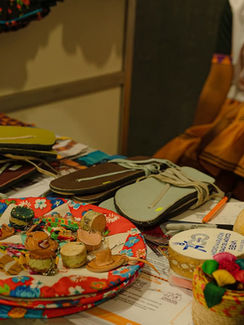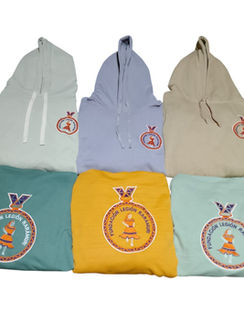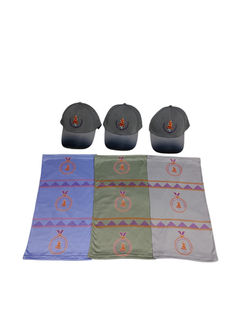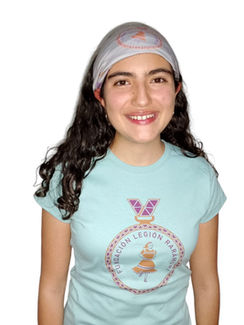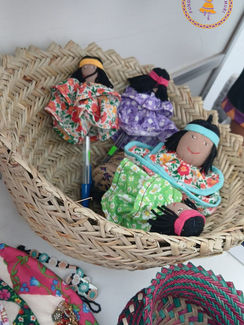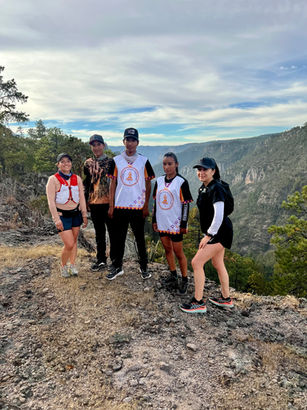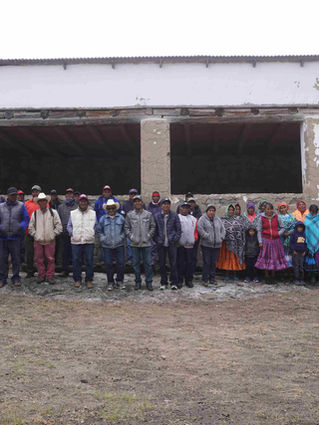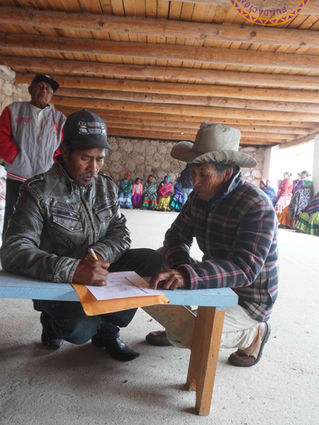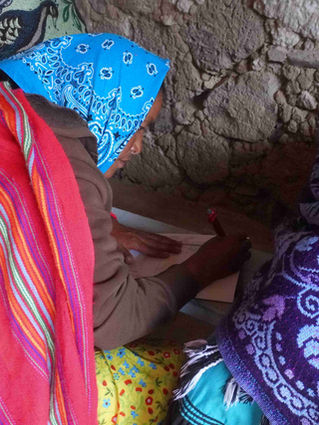
Rarámuri Legion
Who are we?
For the Raramuri, resistance is a fundamental social value. Their cultural preservation and ethnic identity depend on it.
For the Raramuri People the will to preserve their identity has forged a nation with a decisive character and a firm spirit, which in the most adverse circumstances has managed to defend its culture, with admirable dignity and pride. It is from this spirit and its legacy that this initiative comes to life, through a non-profit civil association with the purpose of contributing, through humanitarian actions, to the benefit of their communities, which are at risk facing basic food shortages that require urgent attention.
Presentation

In addition to the aid work, we promote social development projects rooted in intercultural and gender equity approaches. We rely on practices that enhance the exchange of diverse knowledge, experiences and values, as well as collective decision making, in order to build consensus and design participatory budgets which aim to attract prosperity, provide security, strengthen civic culture, and to promote the rights and the organizational capacities of the communities where we participate. In addition, we focus on safeguarding and promoting their natural, cultural and sports heritage.

The Rarámuri legend tells that originally, the Sun and the Moon were two children dressed in maguey leaves, who lived in a little house roofed with branches of bushes, without light or company. That is why they created the Tarahumaras,
”so as not to be so alone."
In those times, Onorúame, god of the Sun, after having created the world, wanted to test it. To do so, he took several ears of maíz, or corn, shelled them and then formed the figure of a man, which he blew on three times to give it life.
Later, he made a woman, whom he blew on four times, since she would need more strength to give birth to her children. Thereby were created the people of maiz.
Causes
Our work is inspired by the Rarámuri nation and its incredible capacity to endure and resist.
1. As indigenous people, the Rarámuri have been the object of multiple attacks, which forced their ancestors to flee to the inaccessible Copper Canyon region. An untamable habitat, with inclement weather that often affects their crops, causing malnutrition, leading to poor health, pain and illness. They have also faced the plundering of their natural resources, the illegal felling of their forests and the violence of criminal groups. Despite everything their way of being is peaceful, and their admirable sense of community inspires us to contribute to preserving the natural, cultural and sporting heritage of this noble Rarámuri nation.
2. The resistance of the Rarámuri is also exemplified by their continued survival in the face of the deep deficiencies that they have experienced, and which continue to be perpetuated today among the approximately one hundred thousand inhabitants (INPI, 2019) that make up its population, including situations of extreme poverty. The municipalities located in the Sierra Tarahumara have some of the highest Social Deficiency Index (IRS) indicators in Mexico (CONEVAL, 2020). This makes them a vulnerable group of high priority, which requires the sum of many efforts. At the Foundation Legion Rarámuri (FLR), we fully assume this call to action to work towards improving the conditions experienced in the Sierra Tarahumara.
3. The Rarámuri, whose name means "feet of a runner”, have survived for centuries in a rugged terrain, where running has been both a way of survival and their primary means of transportation. This has turned them into a legion of athletes who have placed Mexico at the top of the podium. In addition, they run races in their traditional clothing, which has generated the admiration of the world running community and given visibility to their culture. At the FLR we seek to leverage this recognition to mobilize resources, combat poverty and preserve their cultural and sporting heritage.
Principles

Solidarity Reciprocity
Solidarity reciprocity is an ethical and ancestral practice that fosters cooperation and identity. In the Rarámuri tradition, it is instituted through the practice of making Korima, a tradition that functions as social insurance, which restores balance when some have and others do not. It is the help that every Rarámuri has the right to request if they really need it. For the FLR, making korima represents the guiding principle of our actions.

Sustainability
At RLF we are guided by sustainability in its biocultural aspect, which recognizes the historical struggles of indigenous peoples; in the defense of their common goods; of their natural resources and in their right to self-determination. We promote ecological ethics which seek to preserve ancestral knowledge and to recover a dialogue in a space of diversity, empathy and respect, and which promotes interculturality and mobilizes solidarity action. We approach our work through an integrated and multidimensional perspective that encompasses social, inclusive, fair, prosperous and sustainable well-being, as embodied in the 17 SDGs, so that no one is left behind or left out.

Interculturality
This principle represents values such as tolerance, diversity and equity. It is based on the premise that all cultural manifestations are worthy of respect and provide a unique value for humanity. At the RLF we believe that running creates a natural link among people, a common language that opens spaces for the exchange of knowledge, values and experiences. People run freely, regardless of race, creed or circumstance. The RLF calls to action for running in freedom, to strengthen bonds of friendship and promote equality, solidarity and peace.

Gender Equality
All over the world, gender inequality prevents women and girls from reaching their full potential. Discrimination and violence against women manifest themselves in various ways and gravely affect those who suffer from it. At RLF, we seek to ensure that Rarámuri women develop in an environment of peace and inclusion and to empower female Rarámuri runners as leaders and mentors for girls and young women in their communities. We also recognize that Rarámuri women, by playing a primary role in the raising of young men and women in the community, are essential to the preservation of their cultural heritage. For this reason, women constitute the central element of our identity.

Accountability
At RLF we recognize the importance of carrying out an exercise in accountability, so that citizens, and particularly those who join this noble cause by donating, can monitor the activities that are carried out and ensure the proper use of resources. As such, the RLF is committed to validating annual financial reports with external audits, in order to generate greater certainty among our donors and beneficiaries. This is because our work is fully committed to the social and collective benefit of the communities in which we participate.
Vision
We aspire to a world in which the Rarámuri people live in peace and prosperity, free of discrimination, and with the adequate conditions to fully and fairly exercise their rights. A world in which their right to self-determination as an indigenous people — as recognized in the Mexican Constitution — is fully guaranteed, and their natural, cultural and sports heritage is safeguarded. A world in which they have access and opportunities to promote and foster their cultural wealth, their artistic talent and their legacy as endurance runners.
Mission
Contribute to closing the inequality gap that Rarámuri communities face by supporting access to a sufficient and nutrient-rich diet, guaranteeing food sovereignty and the right to a healthy and balanced diet, and thereby helping to eradicate illnesses, improve their performance in races, and increase overall quality of life.
General Objective
Build a multi-sector strategic alliance to mobilize resources, raise funds and donations that ensure the preservation of the natural, cultural and sports heritage of the Rarámuri communities where we participate. With this, we aim to address multidimensional issues from the perspective of sustainability, aligned with the 2030 Agenda, to contribute to the prosperity, security and food sovereignty of its inhabitants, improve their health and well-being, ensure access to quality education and sport as an instrument of social integration, promote their culture and traditions, and aid in the recovery their ecosystem services. All of our actions are taken with a comprehensive approach to gender equality and interculturality, and with a focus on generating the conditions in which the Rarámuri people can fully exercise their rights and play a primary role in the sustainable development of the Sierra Tarahumara.
ACTION PROGRAMS
The three lines of action are presented in the following tabs:
Promotion of Sports and Traditional Games
"Before the existence of humans, there lived giants capable of traveling great distances, leaving enormous footsteps, reflected in caves, streams, ravines and stones. The race is a metaphor for the journeys of the giants who left their traces in the land."
Through their traditional games they celebrate the power of running, the rarajípari, “throwing with the foot” with a komakali (small wooden ball) or ball game for men and the rowera, an ariweta or hoop race in which women take part. There are races where they cover up to 250 km.
_edited.jpg)

The game fulfills a divine purpose granted by Onorúame-Iyerúame (Father-Mother, divine duality) to give strength to the world. The komakali or the ariweta must be kept in constant movement, imitating the sun, so that they continue to spin and bring rain and crops As a social act, its relevance is not winning or losing, the essential thing is to have fun and work together. A space of economic exchange is also built by the races, led by the Chokéames, who serve as the referees and organizers of the races and as those responsible for the placing of bets, which can include fabrics, skirts, animals or money.
CHALLENGES
This legacy is being lost, mainly due to the poverty that prevails in the Sierra Tarahumara.

Lack of basic services
housing
61%
Percentage of indigenous social deprivation
in Chihuahua (CONEVAL, 2020)
Backlog
Educational
Lack of
Social security
Lack of basic services
housing
82.2%
47.8%
56.3%
According to the UNDP Human Development Index (HDI) (2020), Batopilas was rated second worst out of a total of 2,456 municipalities.
human development index

Highest Index: B. Juarez (CDMX): 0.908
National Average: 0.752
Batopilas:
0.456
Lowest Index:
Cochoapa
El Grande (Gro.):
0.445
Education
Subindex

Highest Index:
B. Juárez
(CDMX):
0.889
National
Average:
0.662
Batopilas:
0.306
Lowest Index:
S. Martín Peras
(Oax):
0.304
All of this has generated migratory processes that have led to the development of addictions, a situation that prevents the development of physical culture and the promotion of traditional running games.
SPECIFIC OBJECTIVES
3 HEALTH AND WELL-BEING
4 EDUCATION
QUALITY
5 GENDER EQUALITY
11 CITIES AND
COMMUNITIES
SUSTAINABLE
17 ALLIANCES FOR
ACHIEVE
THE OBJECTIVES
-
Through sport, we seek to reduce obesity and premature mortality due to non-communicable diseases related to a sedentary lifestyle, such as cardiovascular diseases, diabetes or other associated health problems.
-
Through physical culture and sport, we contribute to strengthening the prevention and treatment of addictions associated with alcoholism or drug addiction.
-
The promotion of a culture of peace and non-violence, and the appreciation of cultural diversity, gender equality and human rights.
-
To make female Raramuri athletes visible as community leaders and mentors of girls and young people in their communities
-
To redouble efforts to safeguard the cultural and sports heritage of the Raramuri people
-
The construction of alliances with strategic and multisectoral actors that embrace the cause to benefit Raramuri communities

Fund for
athlete scholarships
FUNDRAISING
MODEL

DONATIONS
COMMITTEE
FOR THE PROMOTION OF SPORTS
AND TRADITIONAL GAMES
CREATION
OF 3 FOUNDS

Fund for the discovery
of talent and
sports development

Fund for the
organization of
traditional games
Run for a cause


Mexico City Half Marathon 2025

For the Rarámuri Legion, being part of the "Run for a Cause" strategy promoted by the Mexico City Sports Institute represents an opportunity to vindicate this noble nation, which, despite the grievances, dispossession, and deficiencies they face, has represented Mexico at the top of the podium, becoming a legion of athletes recognized worldwide for their innate ability to run, an ability that constitutes an ancestral legacy of their heritage.
Join us and run for this cause! Let's pay tribute to this indigenous community that inspires and amazes us.
42km Race CDMX 2025
Make your payment to obtain your registration number for the Mexico City Marathon by following these steps
Step 1:
Fill out the form below with your corresponding information.
Step 2:
Select your purchase option. The 42km costs one thousand pesos. You can also help the Rarámuri community by purchasing one of our products shown on the back of the form.
Step 3:
Make the transfer of the marathon registration fee, plus the amount of the products you chose, to the account you will find below.
Step 4:
Upload your payment receipt file in the corresponding section.
Step 5:
You will receive a folio that corresponds to the marathon.
Step 6:
Download the manual. Go to the Emoción Deportiva website and register.




Thank you for your participation, Run for a Cause!
The numbers are sold out.
Registration will open soon.
Register today and get ready to be part of the Mexico City Marathon
We invite you to check out the merchandise from the Rarámuri Legion Foundation; every donation directly supports our athletes and communities.


Copper Canyon
Raramuri Encounter


From May 1st to 5th, 2026

For runners and hikers supporting a cause in favor of the communities of the Sierra Tarahumara
Share the challenging trails of the Barranca alongside legendary light-footed runners and connect with this ancient tradition!
Cabins
Moments from the Rarámuri Gathering 2025
Description:
• A four-night stay including three days of running or hiking through the Sinforosa Canyon and Jaguar Canyon, located in the municipality of Guachochi.
• Spectacular scenery comprised of canyons, rivers, and waterfalls makes these routes an unparalleled, unique, and challenging adventure.
• An intercultural experience shared with the legendary Rarámuri athletes. Together, we celebrate our passion for running and witness their great hospitality.
• We'll go at your pace, organizing different routes according to the experience, speed, and skill level of each athlete or hiker. We'll have advanced, intermediate, and beginner groups to suit your expectations.
Guides
Guides



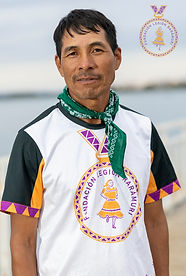


Includes
• Donation to the community.
• Round-trip ground transportation from Chihuahua, plus local tours.
• Four nights at Jaguar Cabins.
• Visit to the community to deliver the donation.
• Rarajípari and Ariweta exhibition.
• Specialized travel insurance.
• Safety measures and first aid.
• Radio communication during the hikes.
• Routes in GPX files.
• Rarámuri guides.
• Food.
• Hydration for the hikes.
• Surprises.
• Photographs taken during the hikes.
Not Included:
• Airfare
• Entrance to the hot springs (optional)
• Personalized photographs
Costs:

Transfer
or Deposit
$ 19,500.00 mx
Payment with CLIP
$20,315.00 mx
3 months with CLIP
$21,500.00 mx
6 months with CLIP
$22,400.00 mx
9 months with CLIP
$25,500.00 mx
12 months with CLIP
$23,750.00 mx
*Prices do not include VAT

Pre-registration
Limited Availability!
Register Now!
Política de Anticipos y Cancelaciones
Gallery
The Rarámuris say: “one who cannot resist, is worthless, dies, disappears.”
Video: Interview with Silvino
About Us
Committee for the Promotion of Sports and Traditional Games



%200_07_14.png)


Veronica
Palma
Silvino Cubesari Quimare
Jose Castelazo DL
Yulisa Fuentes Bustillos
Rosa Angela Parra Cruz
Jaime Fuentes Bustillos
Committee Responsibilities
1. Allocation of athletic scholarships based on sporting merit.
2. Define a selective system to form delegations for athletic races and ultramarathons.
3. Injury prevention, care and physical recovery.
4. Carrying out physical and athletic tests.
5. Detection and development of sports talent.
6. Form a league of chokéames by municipal or ejidal section.
7. Organization of traditional games and inter-community races.
8. Search for sponsors.

Video: Traditional Games
Allies










Donations
Fundraising Model
PHASE 1 - INCOME
PHASE 2 - PROJECTS

-
International Organizations and Cooperation Agencies of Foreign Governments
-
Federal, Subnational, Local Government
-
NGOs
-
Companies
-
Individuals
-
Racing
-
Others
DONATIONS IN MONEY
OR IN KIND
%2021_34_edited.jpg)
FOOD ATTENTION
TO PRIORITY GROUPS
By providing
nutritious food, sufficient and
of quality, we seek that
our actions contribute
to reduce hunger and
malnutrition in the ejidos of
Choguita, Tatahuichi and
Ochocachic in the municipality of
Guachochi and in the ejido of
Huisuchi in the municipality of
Batopilas. With these actions
We seek to expand the chain of
supplies to the groups of
attention.

PROMOTION OF SPORT AND
TRADITIONAL GAMES
-
Athlete Scholarship Fund
-
Allocation of athletic scholarships based on sporting merit
-
Injury prevention, care and physical recovery
-
-
Fund for talent detection and sports development
-
Define a selective system to form delegations to athletic races and ultramarathons
-
Conducting physical-athletic tests
-
Detection and development of sports talent
-
Search for sponsors
-
-
Fund for the organization of traditional games
-
Form a league of chokeamanes by municipal or communal section
-
Organization of traditional games and inter-community races
-

PRODUCTIVE PROJECTS
AND BUDGETS
PARTICIPATORY
-
Organization of Consultations and Consensus Building
-
Conducting deliberative workshops
-
Projects for food sovereignty
-
Agroecological
-
Backyard Breeding
-
Ecosystem restoration
-
Ecosystem restoration
-
Waste management
-
Productive Projects
-
Crafts and handicraft workshops .
Bank : Santander Mexico
Name: Rarámuri Legion Foundation AC
Account Number: 65-51067905-1
CLABE: 014180655106790517
Branch: 5565
SWIFT code: BMSXMXMMXXX
Branch Address : Centenario No. 21, Coyoacán, CDMX, CP 04000
Enter the program to which the donation is directed in the reason for transfer
1. Care
2. Promotion of Sport
3. Productive Projects












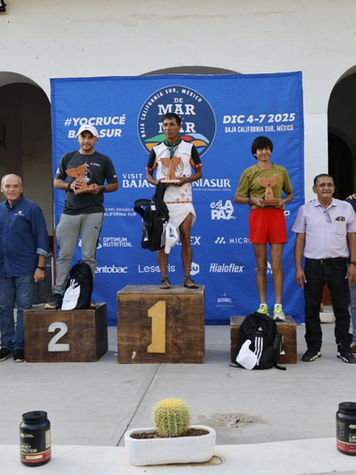









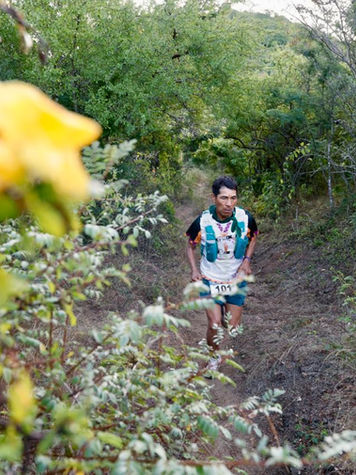




%200.jpg)



































